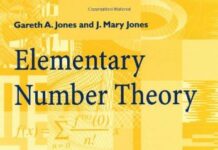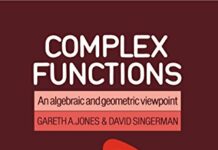
Ebook Info
- Published: 2000
- Number of pages: 223 pages
- Format: PDF
- File Size: 8.97 MB
- Authors: Gareth A. Jones
Description
This text is an elementary introduction to information and coding theory. The first part focuses on information theory, covering uniquely decodable and instantaneous codes, Huffman coding, entropy, information channels, and Shannon’s Fundamental Theorem. In the second part, linear algebra is used to construct examples of such codes, such as the Hamming, Hadamard, Golay and Reed-Muller codes. Contains proofs, worked examples, and exercises.
User’s Reviews
Reviews from Amazon users which were colected at the time this book was published on the website:
⭐Very readable. A good choice of topics and pace for beginning students. The writing and mathematics is carefuland well done.
⭐Using part A, B and C do the following…. sums up most of the book. very light on basic information, if you are just string with the materiel this is not the right book. honestly if this was not required by university would not have bought.
⭐Not all subjects are included: Arithmetic Codes, Jpeg, LZ77 etc. Answers are on back of book, they are simple and more details are needed from student
⭐Incomplete proofs, very short solution to exercise questions (just a hint), too much back and forth between chapters and unexplained theorems. Unless you need this book for school, don’t buy this book.
⭐This is a great introductory book. Other than some basic math you need no other background to get started with this book. It is an effective tool for learn information theory. The Authors take a “build from the ground up” approach. A lot of authors try to go straight to information and entropy and then talk about source and code languages. In my opinion, starting the other way around actually makes things clearer as to what the information content that you are studying is.
⭐I taught an introductory undergraduate course on information theory to a small class with this book as the course book. While this book does not provide a basket full of lemmas and deep insight for doing research on quantifying information, it does what it aims to do flawlessly: provide a very accessible, lean, to-the-point and self-contained survey of the main theorems of information and coding theory. If only the undergraduate course I took back in the day had used this book as the course book.
Keywords
Free Download Information and Coding Theory (Springer Undergraduate Mathematics Series) 2000th Edition in PDF format
Information and Coding Theory (Springer Undergraduate Mathematics Series) 2000th Edition PDF Free Download
Download Information and Coding Theory (Springer Undergraduate Mathematics Series) 2000th Edition 2000 PDF Free
Information and Coding Theory (Springer Undergraduate Mathematics Series) 2000th Edition 2000 PDF Free Download
Download Information and Coding Theory (Springer Undergraduate Mathematics Series) 2000th Edition PDF
Free Download Ebook Information and Coding Theory (Springer Undergraduate Mathematics Series) 2000th Edition

